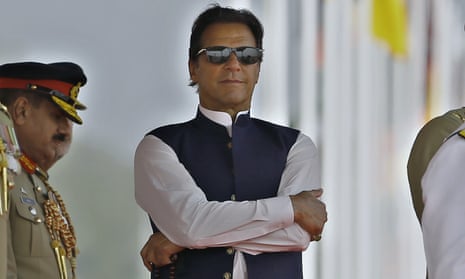Pakistan is on the brink of a constitutional crisis and the prime minister, Imran Khan, is facing accusations of treason after he dissolved parliament and called fresh elections in order to block a no-confidence vote that was expected to remove him from power.
The former superstar cricketer turned politician stunned the country after he took the dramatic action of dissolving the legislature prior to a parliamentary vote that could have stripped him of his prime ministership.
Khan has alleged that the no-confidence vote was a “foreign conspiracy”, citing an alleged “threat letter” from the US about his removal. The US has denied any involvement.
Khan, 69, instructed the deputy speaker of the house, a close ally, to suspend the vote and asked the president to dissolve parliament on Sunday morning, hours before the vote was due to take place.
In his address, soon after the session was adjourned, Khan said: “I congratulate the nation, a foreign conspiracy against the government has been defeated.”
The information minister, Fawad Chaudry, confirmed that Khan would remain as prime minister until elections were held in the next 90 days, despite parliament and his cabinet having been dissolved.
The move shocked opposition politicians and analysts, who called it unconstitutional and a “civilian coup” by Khan’s government. The leader of the opposition, Shahbaz Sharif, called it a “black day for Pakistan as Khan has abrogated the constitution of Pakistan”.
Many feared that the political turmoil puts Pakistan’s fragile civilian democracy at risk and could pave the way for the country’s powerful military establishment to step in and declare martial law or seize control in a coup, as has happened multiple times in Pakistan’s history since it was formed in 1947.
Khan came to power on the back of what many believe was the backing of Pakistan’s powerful military establishment, who still hold considerable sway and influence over the quasi-civilian government.
However, in recent months, Khan was seen to have lost its support with discord over senior appointments and the military had also distanced itself from Khan’s allegations of an international conspiracy to topple him, instead emphasising the military’s wish for good relations with the US and Europe.
On Sunday, when asked if the army stood behind Khan’s government’s actions to dissolve parliament, the spokesperson of the armed forces said “absolutely not”.
The opposition coalition, which had tabled the no-confidence vote and said it had collected enough votes to oust Khan, expressed outrage at Khan’s move. It took a petition against the dissolution to the supreme court, which will hear the case on Monday, and said it would request that Khan faces charges of treason.
The opposition politician Bilawal Bhutto Zardari said: “We will be in the parliament until the vote takes place today. Imran Khan can’t dissolve the parliament. Khan has trampled on the constitution. The supreme court should take notice of it.”
Pakistan’s chief justice reiterated that no political party had a right to make unconstitutional decisions and sent a notice to the attorney general. Not long afterwards, the deputy attorney general resigned, stating that he could not defend the government’s actions in dissolving parliament.
Ahsan Boon, the president of the supreme court bar, said that if the supreme court judges did not rule against Khan’s actions to dissolve parliament they would be “traitors to Pakistan”.
“I appeal to the chief justice of Pakistan to immediately intervene and declare all of this unconstitutional,” said Boon.
Zafarullah Khan, a constitutional expert, also confirmed to the Guardian that he believed Khan’s actions had violated Pakistan’s constitution.
“The speaker was constitutionally bound to conduct the vote on no-confidence,” he said. “Subverting a ruling using another ruling is absurd and unconstitutional. The prime minister cannot dissolve the assemblies.”
Khan came to power in 2018, on the back of promises to fight corruption, revive Pakistan’s ailing economy, and no longer appease countries such as the US that had used Pakistan as a proxy in their “war on terror”.
He underwent a radical transformation from an international playboy known for his marriage to the socialite Jemima Goldsmith to a devout and pious Muslim who spoke viciously against the excesses and politics of the west.
However, his time in office was marred by economic problems, security issues and a crackdown on freedom of the press, while record-breaking inflation has turned much popular opinion against him.
Aasim Sajjad Akhtar, an author and political analyst, said Khan’s supporters still viewed him as “a virtual messiah who would cleanse Pakistan of ‘corruption’ and fight crusades against the corroding influences of western culture”.
He added: “His cult-like supporters still hold on to this myth but his dissolution of the national assembly rather than face a no-confidence vote make clear that he will do anything he can to remain in power.”
